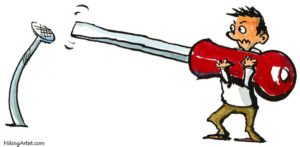Staff Turnover

Staff turnover has several possible causes: you, the staff, or more likely … the wrong process. This is especially true when asking staff to achieve goals without the right tools.
In the face of what I believe to be compelling truths and urgency, how is it possible that hospitals are not inspired to transforming outpatient pharmacy operations? Staff turnover is one consequence of failing to match performance expectation with the right operating model.
Outpatient pharmacies operating as retail clones are breeding grounds for expectation and performance discontent. It is fair to say that job dissatisfaction results in most employee driven turnover in pharmacies. Some dissatisfaction turnover always occurs as satisfaction is a personal measure. It is also fair to say unrealistic performance expectations cause some employer driven turnover.
Pharmacy leaders need to understand outpatient pharmacies operate at a significant disadvantage to in-market retail pharmacies. Retailers tune process and production to maximize profit by transferring the burden of slower delivery systems to customers. In the absence of compelling reason or benefit to do so, discharges and other patients will not tolerate a slow outpatient pharmacy delivery system.
Outpatient pharmacy operations must provide multiple products to more demanding markets with respect to processing, delivery, patient experience, and discharge transition. Effective product delivery can take more time and cost more per patient than at retail drug stores, where the burdens of delay transfer to the patient. On the upside, effective product delivery benefits the patient and lowers hospital risk.
Hospitals that pair performance expectations with process and production tools reduce the risk for staff turnover. Retail clones are not tuned for one-chance, limited delivery windows. Retail clones work well for captive hospital markets such as employees or patients dependent on financial assistance where any burden easily passes along to the employee or patient. In these instances, hospitals must lower expectations for capturing free-to-choose markets in order to reduce staff turnover.
Hospitals embracing the importance of therapeutic outcome to market and financial stability, also need to pair expectations with process and production tools that differentiate from retail, enabling more patients to leave the hospital with medication in hand and confident therapeutic outcome care follows them. In short, to expect more, process and production tools must provide a higher benefit yield than retail.
Who takes the first step towards transformation? Good question. Ideally, top management can recognize the need for a transformative approach to pharmacy and take the necessary steps. In the absence of this, pharmacy management must take the initiative to design new process and production tools, and present these to upper management. If you don’t fix something that is consistently not working, then you only have yourself to blame for turnover.